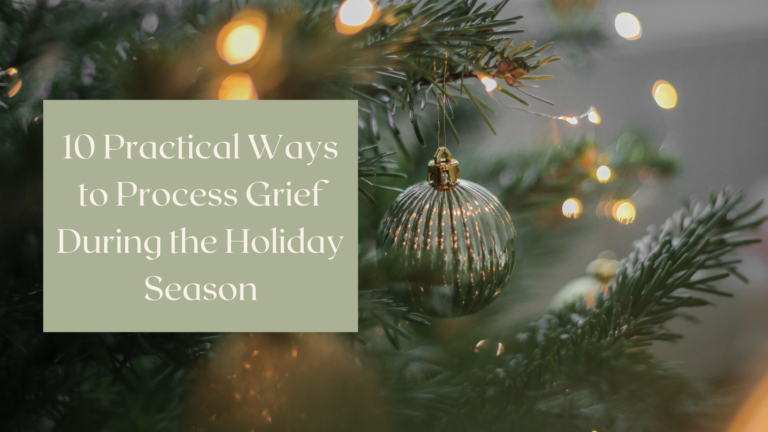Navigating Grief During the Holidays: A Guide for Those Who Have Lost a Baby
The holiday season arrives with its twinkling lights and cheerful carols, but for those who have experienced pregnancy or infant loss, the “most wonderful time of the year” can feel anything but wonderful. Empty stockings that should have been filled, missing faces in family photos, and the constant reminder of what could have been can make grief feel especially heavy during December.
If you’re carrying the weight of loss this holiday season, I want you to know something important: your feelings are valid, your grief matters, and you’re not alone. As someone who has walked this path, I understand the unique ache of missing a baby during the holidays, and I want to offer both comfort and practical guidance for navigating this challenging season.
What is Grief?
Grief is our natural response to loss, but after you’ve lost a baby, it carries unique challenges. Unlike other losses where you have tangible memories to hold onto, pregnancy and infant loss often involves mourning dreams that never had the chance to unfold. You’re grieving not just your baby, but all the “firsts” you’ll never experience – first Christmas, first steps, first words…
The Bible shows us that grief is deeply human and deeply holy. Jesus himself wept (John 11:35). David poured out his anguish in the Psalms. These weren’t signs of weak faith – they were expressions of deep love.
Why Is Grief Tougher During the Holidays?
The holiday season amplifies grief in ways that can feel overwhelming. Empty stockings. Family photos missing a precious member. Holiday cards announcing others’ joy while you’re carrying such profound loss. Everything about this season seems designed to remind us of what’s missing.
The emphasis on family traditions and celebrations can make your loss feel even more acute. Seeing other families complete, watching children visit Santa, or simply hearing “Silent Night” can trigger waves of grief that feel impossible to navigate.
Additionally, the pressure to be “merry and bright” during this season can feel suffocating when you’re grieving. Like Mary at that first Christmas, you might be carrying both profound love and profound pain in your heart simultaneously.
What Isn’t Needed
While people mean well, certain responses to grief can cause more harm than healing. Here’s what you don’t need during this season:
Pressure to “get over it” or “move on”
Your grief doesn’t have an expiration date. Like Rachel who was weeping for her children (Jeremiah 31:15), your sorrow is valid no matter how much time has passed.
Forced cheerfulness
You don’t need to pretend to be okay for others’ comfort. Jesus was honest about his feelings in the Garden of Gethsemane, and you can be honest about yours.
Platitudes or easy answers
Comments like “everything happens for a reason” or “at least they’re in heaven” might be well-intentioned but can diminish your very real pain.
Comparison of grief
Your loss is unique to you. Like David grieving differently for different children, your grief journey is your own. It doesn’t matter when you lost your baby. The fact is that you did, and it’s awful.
What Is Needed
Here are a few things that can truly help during this difficult season:
Permission to Grieve
Give yourself grace to feel whatever you’re feeling. Some days might be easier than others, and that’s okay. Like the psalmist who honestly expressed both pain and hope, you can hold both grief and faith in your heart.
Safe Spaces and People
Surround yourself with people who understand or at least try to understand. Hannah found comfort pouring out her heart at the temple. Find your safe spaces and people who will sit with you in your grief.
Meaningful Remembrance
Create ways to honor your baby’s memory during the holidays. There are tons of ways to do this – both extravagant and simple. Here are a few ideas:
- Light a special candle
- Hang a memorial ornament
- Create a charitable tradition in their honor
- Write them a letter
- Plant winter flowers
Practical Support
Accept help with holiday tasks or give yourself permission to skip certain traditions this year. Remember how the early church supported each other in practical ways (Acts 2:44-45). If you haven’t already, make sure to check out our FREE community.
Spiritual Comfort
Go to God, even in your pain. Like David, who wrote both laments and praise, you can be honest with God about your struggles while holding onto hope. You can be angry with Him and still trust that His plan is good.
Self-Care Practices
- Rest when you need to
- Set boundaries about holiday events
- Take time for quiet reflection and prayer
- Care for your physical needs (go for a walk, get some exercise)
- Spend time in Scripture (even if you rarely have before)
Remember, the first Christmas itself was born out of difficulty and pain. Mary’s journey wasn’t easy. The world was dark. But God was faithful, bringing light into darkness and hope into despair.
As you navigate this holiday season, know that your grief is seen and sacred. Your baby matters. Your pain matters. And just as God was present in that first Christmas story, He is present with you now, holding your broken heart and collecting every tear (Psalms 56:8).







